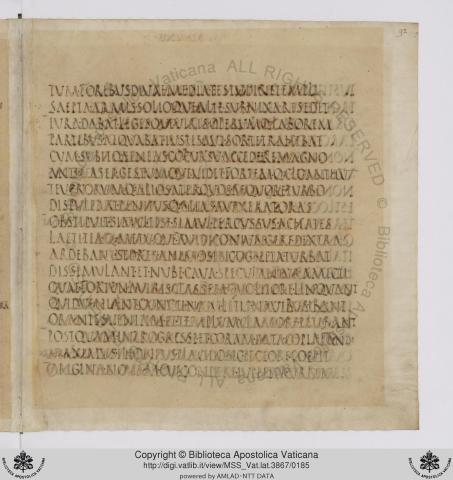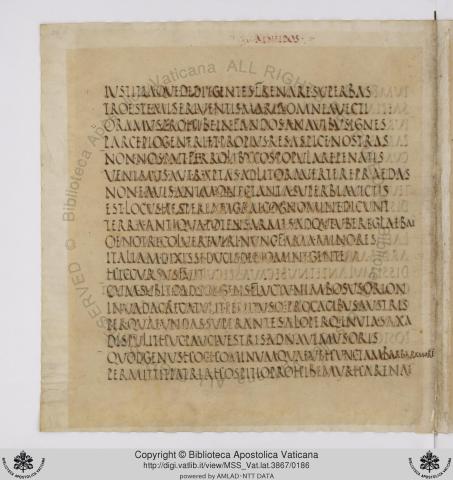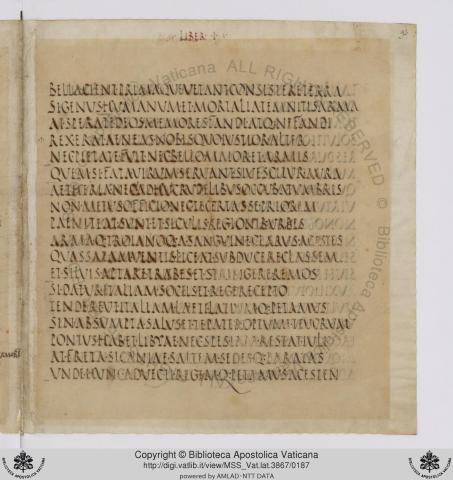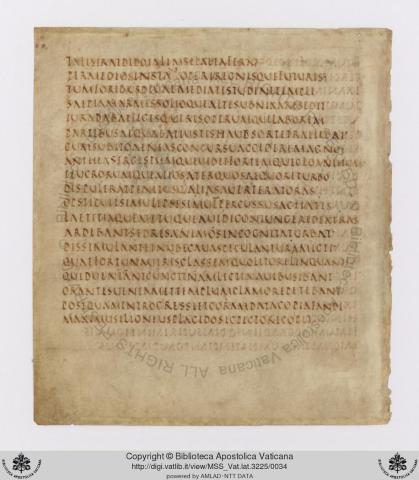Postquam intrōgressī et cōram data cōpia fandī,520
maximus Īlioneus placidō sīc pectore coepit:
'Ō rēgīna, novam cui condere Iuppiter urbem
iūstitiāque dedit gentēs frēnāre superbās,
Trōes tē miserī, ventīs maria omnia vectī,
ōrāmus: prohibē īnfandōs ā nāvibus ignēs,525
parce piō generī et propius rēs aspice nostrās.
Nōn nōs aut ferrō Libycōs populāre penātēs
vēnimus, aut raptās ad lītora vertere praedās;
nōn ea vīs animō nec tanta superbia victīs.
Est locus, Hesperiam Grāī cognōmine dīcunt,530
terra antīqua, potēns armīs atque ūbere glaebae;
Oenōtrī coluēre virī; nunc fāma minōrēs
Ītaliam dīxisse ducis dē nōmine gentem.
Hic cursus fuit,
cum subitō adsurgēns flūctū nimbōsus Orīōn535
in vada caeca tulit penitusque procācibus Austrīs
perque undās superante salō perque invia saxa
dispulit; hūc paucī vestrīs adnāvimus ōrīs.
Quod genus hoc hominum? quaeve hunc tam barbara mōrem
permittit patria? Hospitiō prohibēmur harēnae;540
bella cient prīmāque vetant cōnsistere terrā.
Sī genus hūmānum et mortālia temnitis arma,
at spērāte deōs memorēs fandī atque nefandī.
notes
Manuscripts: M 520-523, 524-543 | P 520-529, 530-543 | R 520-522, 523- 540, 541-543 | F
Ilioneus as spokesman addresses Dido: “Great Queen, we pray that you save our ships from being burned. We are unhappy Trojans driven on your shore with no hostile purpose but under stress of storm while sailing for Italy. Why refuse us the hospitality of the shore? Heaven forbids such wrong.” (Page). Ilioneus’ speech is resolute, clear, and honest. It serves a double purpose, (a) to tell the reader what had been happening, showing that Mercury’s mission (300ff.) had not only been necessary but had nearly come too late, (b) to tell Dido how much Aeneas’ men look up to him, how just and brave he is (or was, for the men in their turn fear that they have lost him) (Austin).
520: intrōgressī: sc. sunt illī Teucrī (Pharr); i.e., under the dome, where Dido sat in front of the cella (testūdine “vaulted roof,” line 505) (Papillon-Haigh). coram: sc. rēgīnā (Frieze), “in the presence of” [the queen] (Chase), “to the queen in person” (G-K). data cōpia fandī: sc. est (Pharr): “an opportunity was given to speak” (Wetherell). fandī: genitive case gerund of for, fārī (AG 502, 504). V. takes the license, familiar in all stories of travel or war from Homer onwards, of assuming that all his characters spoke one language, namely the language of his readers (Conway).
521: maximus: in prose maximus nātū (Storr), used as the superlative of senex, “old” (Robertson): “first in years, rank, and dignity” (Chase); the oldest and therefore the spokesman (Carter). Īlioneus: with the eu pronounced as a diphthong (one syllable) (Pharr). Ilioneus is employed as spokesman again in the parallel passage starting at 7.212 (Conington). placidō pectore: “calm,” as befitting his age and dignity, contrasted with clāmōre, line 519 (G-K). coepit: sc. loquī, “begins to speak.”
522: An argumentum ad hominem: “The gods have allowed you to found a new kingdom and rule it by justice, let us do the same” (Storr). rēgīna: i.e., Dido (Robertson). cui: dative indirect object with dedit (Robertson).
522–3: condere, frēnāre: objects of dedit, “has granted (the right) to” (Pharr).
523: gentēs superbās: “proud nations” (Frieze), referring to the neighboring Africans among whom she settled (Chase), not to the Carthaginians (Frieze). Those same tribes are referred to as genus intractābile bellō in line 339 (Carter).
524: Trōes tē miserī: in apposition with nōs, the understood subject of ōrāmus (Pharr). Observe the emphatic position of Trōes (Frieze) and of tē between the subject and its attribute (Carter). The queen knows the story of the Trojan War and Ilioneus gains her sympathy from his opening words (Wetherell). ventīs vectī: note the alliteration, with pathetic effect (F-B). Vehor often means nāvigō, and the latter sometimes governs the accusative (Frieze). maria omnia: sc. per (Pharr); accusative of space traversed (AG 425) governed by vectī (Robertson), taken in an active sense: “having traversed all seas” (Frieze).
525: īnfandōs: “inhuman,” as violating the right of peaceful strangers (G-K), “unspeakable,” and so, horrible. The Carthaginians were treating the Trojans as pirates and have threatened to burn their ships (F-B). It was a violation of hospitality to maltreat strangers (Wetherell). ā nāvibus: sc. nostrīs (Pharr); ablative of separation (AG 401, 402).
526: parce piō generī: pathetic alliteration, continued in propius (F-B); “refrain from hurting” (Robertson) or “spare a pious race” (Chase), i.e., the Trojans; piō is “god-fearing” (Wetherell), “righteous,” i.e., obedient to the gods; hence, deserving to be received in a friendly manner (Frieze). Generī is dative with the special intransitive verb parce (AG 367). propius rēs aspice nostrās: take aspice in the sense of “regard.” The comparative propius adds a touch of humility (Storr); literally “more closely,” implying that their real character and circumstances have been misunderstood (Frieze).
527: nōn: emphatic from its position at the beginning of the line, forming an alliteration with nōs: “we have not, as your people seem to suppose” (G-K). populāre penātēs: Penātēs = “hearths” or “homes” (Frieze); alliteration (Pharr).
527–8: populāre, vertere: “we have come not to devastate” (Page); infinitives of purpose with vēnimus, a verb of motion (AG 460c) (Pharr), common in Greek but confined in Latin to poetry, though occasionally found in Livy and in prose authors of the silver age (Storr). The accusative supine (populātum, versum) or the gerund (ad populandum, ad vertendum) is undoubtedly more usual than the infinitive (Pharr). Populāre seems here to refer to slaughter, as distinguished from pillage (ad lītora vertere praedās) (Conington).
528: vēnimus: the quantity of the first syllable shows that the verb is in the perfect tense (Chase). raptās vertere: a condensed expression: “to drive stolen booty” (F-B), “to seize and drive away”; Vertere is for āvertere, and refers especially to captives and cattle, which would form the most valuable part of the booty (Frieze).
529: ea: “such” (Frieze). vīs: sc. est (Pharr): “violence” (Carter). victīs: alludes to the destruction of Troy (Wetherell). animō (nostrō), victīs: datives of possession (AG 373) (Pharr). superbia: sc. est (Pharr): “audacity” (Carter). “Such violence belongs not to our nature (piō generī, 526), nor such daring to our vanquished condition” (Conington).
530: Hesperiam…dīcunt: sc. illum locum; dīcunt = vocant (Pharr). Hesperia is a Greek word, “the Western land,” strictly speaking it is only by a Greek writer (Graī dīcunt) that Italy can be called “the Western Land,” but the Roman poets continually use the word in imitation of their Greek models (Page). Compare Hesperus, “the evening star,” cognate with vesper (Chase). Hesperia is frequently used of Italy by poets, largely to avoid Italia (which consists of four short syllables, difficult to incorporate into the dactylic hexameter (F-B). Grāī: an old poetical name for Graecī (H-M). cognōmine: ablative of specification (AG 418) (Wetherell).
531: terra antīqua: a land old in story (Conington) or a land long inhabited (Carter). armīs, ūbere: ablatives of respect (AG 418) or cause (AG 404) with potēns (Pharr). Potēns seems to belong more naturally to armīs than to ūbere (Conington). Ūbere = ūbertāte, “fertility” (Wetherell), “richness of soil.” Vergil is the poet of Italy, as well as of Rome (F-B).
532: Oenōtrī: The name was evidently derived from a Greek word, Oenōtria, “Vineland,” since grapes were much cultivated in Italy (Pharr). Oenotrus was a mythical king of Arcadia, who planted a colony somewhere in Italy (Robertson). coluēre: = coluērunt; sc. eam (Robertson): “tilled it,” i.e., of old, the exact force of the perfect being at once made clear by the antithetical clause which follows: “now it is said that a younger generation has called it Italy.” nunc: this implies that Oenotria was its former name (G-K). fāma: predicate nominative with est (understood) = dīcunt, and so followed by indirect discourse (Pharr): “now the story is [that…]” (F-B). minōrēs: “a younger generation,” “descendants,” as opposed to māiōrēs, “ancestors” (Page); accusative subject of dīxisse (= vocāvisse) (Pharr).
533: ducis: according to this account, the name of Italy came from Italus, a leader of the Oenotrians (F-B). Ītaliam, gentem: predicate accusative (AG 393); gentem = terram (Wetherell), “the nation,” for “the land” by metonymy (Frieze).
534: hic cursus fuit: sc. nōbīs (Pharr). Hic must not be mistaken for the adverb hīc; hūc is found in some editions, but not on good authority (Frieze): “This (i.e., hither) was our course” (Chase). The sense of this partial line is complete, as indeed, in nearly all other instances (Frieze). There are more than fifty such incomplete lines (“hemistichs”) in the Aeneid, one of the marks of the unfinished state of the poem at Vergil’s death (Pharr). If Vergil had lived to revise the work, he would probably have completed all the incomplete lines, but this is a much debated question (Storr).
535: subitō adsurgēns flūctū: subitō can be taken as an adverb: “rising suddenly from the wave” (Frieze), or as an adjective: “rising with a sudden swell.” The word adsurgēns was intended to combine the rising of the constellation Orīōn and the rising of the wave (Pharr). flūctū: ablative of place where (AG 429 note 4) (Pharr) or ablative of separation (AG 381) (Wetherell). Orīōn: the first O in Orīōn here is short, though in 3.517 it is long (Frieze). Orion was a mighty hunter and an attendant upon Diana, who was changed into a constellation (Robertson). Storms are frequently connected with the setting of Orion in November as well as, here, with its rising, which took place in mid-summer (Conington). 536: vada caeca: “hidden shoals” with caecus in the passive sense of “unseen” (Carter). tulit: sc. nōs (Pharr). penitus: “far away,” as in line 512 (Chase), or taken with procācibus: “fiercely boisterous” (Anthon). procācibus Austrīs: procācibus applied to the south wind as being fierce and strong (Robertson); one wind put generally for all (G-K); ablative of means (AG 409) (Pharr). Note the alliteration continued into the next line. The dactylic rhythm of the verse suggests rapid movement (F-B).
537: perque…perque: note the repetition and the polysyndeton, to emphasize their perils (F-B). superante salō: another alliterative phrase (F-B); sc. nōs (Pharr): either “the briny sea overpowering us” or “the waves rising high.” The former, implying that they were unable to make headway and were driven before the wind, is perhaps more in accordance with the context, but both may be intended (Conington).
538: paucī: sc. nostrum; subject of adnāvimus (Pharr): “only a few of us” (G-K), “few in number,” that is, compared with the whole fleet (Frieze); he does not know of the safety of the seven ships under Aeneas (Carter); “a poor remnant [of us]” (Conington). vestrīs ōrīs: = ad vestrās ōrās, dative of direction (AG 428, note h) (Pharr), an explanation of preceding hūc (Storr). adnāvimus: “floated” or “drifted”; in prose the word is used of an ordinary approach to land, but Vergil doubtless meant something more (Conington). In this verse note the powerful effect of the opening dactyl and pause, followed by spondees (F-B).
539: quod genus hoc: sc. est (Pharr); quod is the interrogative adjective as a pronoun (AG 148) (Chase). The question refers to the Carthaginian subjects of Dido (Frieze). tam barbara: i.e., is so barbarous as to allow… (G-K). hunc mōrem: explained more fully in the next line (F-B); the Trojans had not been allowed to beach and repair their ships (see line 551) (Pharr).
540: hospitiō: sc. ab; ablative of separation (AG 401, 402) (Pharr). There is a pathetic force in hospitiō; we are barred even from the welcome which the shore gives the shipwrecked man (Conington).
541: bella cient: sc. virī tuī (Pharr): “those people of yours are inciting war” (F-B), referring to the same Carthaginians stationed to guard the ship. Dido has commanded her people to oppose the landing of strangers (Frieze). vetant: sc. nōs (Pharr). prīmā terrā: sc. in; ablative of place where (AG 429), “on the first (part of, edge of) your land,” that is, “on the beach” (Pharr).
542: sī genus…arma: i.e., if you are so strong as to defy human indignation (Conington). mortālia arma: “mortal arms,” i.e., arms of mortals (Page). temnitis: the simple temnere by archaism for contemnere. It is used by Vergil four times, always in speeches (F-B).
543: at: “yet” (F-B), “at least” (G-K). spērāte: sc. fore (Wetherell), in the sense merely of expectation (Conington); a neutral word applied to future good or ill (Storr): “look for” (Robertson), “look forward to,” hence, “be assured” (F-B). deōs memorēs fandī atque nefandī: sc. esse (Pharr): “gods who remember right and wrong,” i.e., be assured that in the time to come the gods will reward you according to your deserving (Page); memorēs links with fandī, nefandī (AG 349), which serve as genitives of the indeclinable fās and nēfās (Storr): fandī, “right,” only used in this sense, as the opposite of nefandī, “unspeakable,” and so “wrong” (G-K).
vocabulary
intrōgredior, gressus sum, 3, dep. n.: to go within; enter, 1.520. (intrō and gradior)
cōram: (prep. and adv.; prep. w. abl.), in the presence of; before; (adv.), in person, face to face, openly, in presence, 1.520, 595.
Īlioneus (quadrisyll.), eī, m. (acc. ēa instead of ea, 1.611): commander of one of the ships of Aeneas, 1.120, et al.
placidus, a, um: adj. (placeō), gentle, calm, tranquil, peaceful, serene, 5.848; inactive, idle, 9.187; friendly, propitious, 3.266; (adv.), placidē, gently, softly, quietly, calmly, 5.86.
ō: (interj. expressing joy, grief, astonishment, desire, or indignation), O! oh! ah! w. voc., 2.281, et al.; w. sī and the subj., oh that, 11.415; sometimes placed after the word to which it relates, 2.281.
rēgīna, ae, f.: a queen, 1.9; princess, 1.273. (rēx)
Iuppiter, Iovis, m.: Jupiter, son of Saturn and Rhea, and king of the gods, 1.223; Iuppiter Stygius, Pluto, 4.638.
iūstitia, ae, f.: righteousness, justice, equity, 1.523, et al. (iūstus)
frēnō, āvī, ātus, 1, a.: to bridle, 5.554; check, curb, restrain, 1.54, 523. (frēnum)
Trōes, m.: (subst.), the Trojans, 1.30, et al. (Tros, one of the kings of Troy)
īnfandus, a, um: (adj.), not to be uttered; unutterable, inexpressible, unspeakable, 4.85; cruel, 1.525; dreadful, horrible, 10.673; accursed, perfidious, 4.613; fatal, 2.132; neut., in exclamations, īnfandum! O shame, O woe unutterable! 1.251; pl., īnfanda, as(adv.), 8.489.
Libycus, a, um: (adj.), Libyan, 1.339, et al.; subst., Libycum, ī, n., the Libyan or African sea, 5.595.
populor, ātus sum, 1, dep. a., and populō, āvī, ātus, 1, a.: to lay waste; ravage; ransack, 4.403; devastate, plunder, 1.527; rob, deprive, 6.496; of things, 12.525. (populus)
Penātēs, ium, m.: gods of the household; hearth-, fireside gods, 2.514, et al.; tutelary gods of the state as a national family, 1.68; (fig.), fireside, hearth, dwelling-house, abode, 1.527. (penus)
veniō, vēnī, ventus: to come, freq.; come forth; approach, 6.755; rise, appear, 1.353; dawn, 10.241; to present one's self or itself, 5.344; descend, spring from, 5.373; impers., ventum est, we, they came or have come, 4.151.
nec or neque: (adv. and conj.), and not; neither, nor, 1.643, et al.; in prohibition, 3.394, et al.; neque (nec) — neque (nec), neither — nor, 5.21, et al.; nec — et, or -que, may be rendered neither — nor, 12.801; 2.534; nec nōn, and also, nor less, 6.183; nec nōn et, and also, 1.707.
superbia, ae. f.: haughtiness, pride, arrogance, audacity, insolence, 1.529. (superbus)
Hesperia, ae, f.: the western land; Italy, 1.569, et al.
Grāī (Grāiī) (dissyll.), ōrum, m.: the Greeks, 1.467, et al.
cognōmen, inis, n.: a name common to a family; a surname; name, 1.267.
ūber, eris, n.: a teat, an udder, 3.392; the breast, 5.285; breast, bosom, 3.95; (meton.), richness, fertility, fruitfulness, productiveness, 1.531.
glaeba, ae, f.: a lump of earth; a clod; soil, 1.531.
Oenōtrius, and Oenōtrus, a, um: adj. (Oenōtria), of Oenotria, an ancient name of Southern Italy; Italian, Oenotrian, 1.532, et al.
Ītalia, ae (Ī by poetic (epic) license), f.: Italy, 1.2, et al.
adsurgō, surrēxī, surrēctus, 3, n.: to rise up; rise, 4.86; swell, fume, 10.95.
nimbōsus, a, um: adj. (nimbus), full of storms; stormy, rainy, 1.535; cloud-covered, 3.274.
Ōrīōn, ōnis, m.: a fabulous giant, celebrated as a hunter; the constellation Orion, 1.535, et al.
vadum, ī, n.: a ford; a shallow, shoal, 1.112; sand-bank, 10.303; shallow water, 11.628; bottom, depth, 1.126; water, tide, stream, 6.320; water of the sea, 5.158; wave, sea, 7.198.
penitus: adv. (cf. penes), inwardly, far within, deep, deeply, 1.200; wholly, entirely, 6.737; afar, 11.623; far away, 1.512.
procāx, ācis: (adj.), bold, insolent; (fig.), wild, raging, 1.536.
Auster, trī, m.: the southerly or south wind, opposite to Aquilo; wind in general, 3.70; (meton.), the south.
salum, ī, n.: the tossing or heaving swell of the sea; the open sea, the main, 1.537.
invius, a, um: without a way; trackless, inaccessible, impassable, 1.537; difficult, 3.383.
dispellō, pulī, pulsus, 3, a.: to drive away; separate, scatter, disperse, 1.538; to part, 5.839.
paucus, a, um: (adj.), small, little; pl., paucī, ae, a, few, a few.
adnō, nāvī, nātus, 1, n. and a.: to swim to, sail toward or to, with dat., 1.538.
ōra, ae, f.: a margin, border, 12.924; coast, shore, 3.396; region, 2.91; rim, extremity, 10.477; pl., outline, compass, 9.528.
barbarus, a, um: (adj.), barbarian, savage, 1.539; foreign, barbaric, 11.777; subst., barbarus, ī, m., a barbarian, mercenary stranger, or soldier.
hospitium, iī, n.: the relation of host and guest; hospitality, 10.460; friendly reception, entertainment; protection, hospitality, welcome, 1.299; guest-land, ally, 3.15; refuge, 1.540; alliance, 11.114. (hospes)
harēna, ae, f.: sand, 1.112; sandy shore, strand, 1.540; sandy ground, arena; space for races; an arena, 5.336.
cieō, cīvī, citus, 2, a.: to cause, to move; stir, 2.419; agitate, move, 4.122; excite, kindle, rouse, 6.165; raise, 12.104; call upon, invoke, 3.68; call up, exhibit, 5.585; of tears, shed, 6.468.
temnō, 3, a.: to despise, disdain, scorn, defy, 1.665; p., temnendus, a, um, to be despised; insignificant, small, 10.737.
at and ast: (conj., denoting addition either with the notion of difference, or of decided opposition), but, 1.46; yet, still, after conditional propositions; in adding new particulars, and in transitions, but also, but, now, 4.1; denoting indignation, with execration, 2.535.
memor, oris: adj. (rel. to mēns and meminī), mindful, remembering, 1.23; heedful, 480; thankful, grateful, 4.539; not forgetting; relentless, 1.4; with nōn or nec, unmindful, regardless, 12.534.
for, fātus sum, 1, dep. a. and n.: to speak, report, say, 1.131, 610; ger., fandī; cōpia fandī, opportunity of speaking, 1.520; fandō, by report, 2.81; while speaking, 2.6; p., fandus, a, um; subst., fandum, ī, n., that may be uttered; right, 1.543. (rel. to φημί)
nefandus, a, um: adj. (nē and farī), not to be spoken; impious, execrable, accursed, abominable, 5.785; perfidious, 4.497; subst., nefandum, ī, n., wrong, 1.543.





